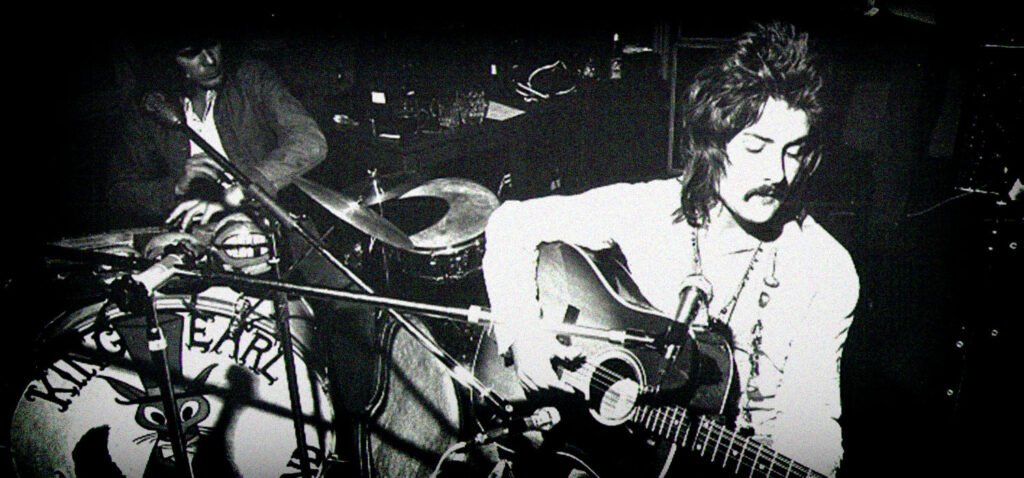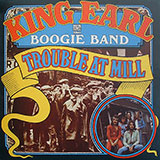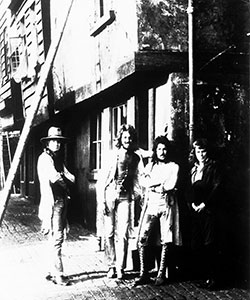King Earl Boogie Band:
Trouble At Mill 1972

Well I listened to it the other day (1989) for the first time in 15 years and to be quite honest, it just doesn’t make it. I don’t know what we were trying to achieve, but somewhere along the line we got terribly lost. Apart from ‘Plastic Jesus’, that is – that really makes it, and in my opinion was the best song the Boogie Band ever recorded and should really have done something, but unfortunately it was blacklisted.
(Paul King)
Pye gave us £3,000 to produce an album. We chose Richard Branson’s ‘The Manor’ at Oxford, to make it. Good atmosphere, but the single, ‘Plastic Jesus’ was immediately banned by the BBC, which effectively killed the commercial possibilities of the album. ‘Plastic Jesus’, a song despising the morality of; ‘I’ve got a plastic charm, I can do what I like to anyone’. To the Beeb, it meant ‘Plastic Jesus’. You tell me that a jock listens to the discs he plays – I’ll tell you b******s.
(Colin Earl)
We spent, I dunno how long rehearsing and we made the record, and then I’m sitting at home waiting to go on the first gig, I think it was supposed to be Barnstable and they said the car would arrive, pick you up. So there I am, waiting all day long and all of a sudden, I get a phone call late in the afternoon, “Oh Joe, we’re not going, Dave Lambert’s left the band, he’s joined The Strawbs! I thought f**k me, here we go! So that was the end of that, sort of, brief experience”.
(Joe Rush)
AllMusic Review by Dave Thompson
 Less than a year after delivering his superlative Been in the Pen Too Long debut album, Paul King was back at the head of the King Earl Boogie Band and armed with a second clutch of songs that is as much a direct follow-up to the earlier set as it is the birth of what should have been a far more successful band than it actually became.
Less than a year after delivering his superlative Been in the Pen Too Long debut album, Paul King was back at the head of the King Earl Boogie Band and armed with a second clutch of songs that is as much a direct follow-up to the earlier set as it is the birth of what should have been a far more successful band than it actually became.
That the King Earl Boogie Band were ultimately scuppered by the failure of the surefire Christmas hit “Plastic Jesus” is a matter of record; it is indeed an indictment of the prevailing super-morality of the era that so lighthearted a poke at junk-store piety could “offend” anyone at all, least of all the program controllers of the BBC.
 Today, it wouldn’t merit a second glance. But, while “Plastic Jesus” inevitably dominates Trouble at Mill, the remainder of the album has a warm, folky bluegrass feel that is just as captivating. The neo-Cockney “Bovver Blues” boogie, one of four songs composed by guitarist Dave Lambert (soon to become such a force within the Strawbs), has a charm that completely predicts such mid-’90s excursions as Blur’s “Parklife,” while “Keep Your Hands off My Woman” is the sound of Slade if they were forced to dress up as Steeleye Span.
Today, it wouldn’t merit a second glance. But, while “Plastic Jesus” inevitably dominates Trouble at Mill, the remainder of the album has a warm, folky bluegrass feel that is just as captivating. The neo-Cockney “Bovver Blues” boogie, one of four songs composed by guitarist Dave Lambert (soon to become such a force within the Strawbs), has a charm that completely predicts such mid-’90s excursions as Blur’s “Parklife,” while “Keep Your Hands off My Woman” is the sound of Slade if they were forced to dress up as Steeleye Span.
But the other must-hear highlight is the beautiful, near-a cappella version of Ewan MacColl’s “Go Down Your Murderers” that wraps up the album — and, sadly, the band’s career — with haunted finality.
More Reviews
Trouble At Mill (anon)
A lot of people are going to ignore this album because of Paul King and Colin Earl's association with Mungo Jerry.
That's cool if you want to shut your mind, but unfair to musicians involved who have come up with a fun album they can be proud of.
Like Mungo, it is boogie. But unlike the Mungo of late, it stretches out and over Russell John Brown's bass work and Joe Rush's workboard percussive work, there are some fine instrumental parts.
Especially from Dave Lambert, who although a shining acoustic guitarist, plays some of the tastiest electric guitar of his career. His fluid trebly electric fill-ins on both, 'If The Lord Don't Get You' and on Ewan McColl's 'Go Down You Murderers' are both exciting in their menacing power and passionate in his obvious love for the music he is playing.
It is on acoustic guitar that his best work is heard. On 'Keep Your Hands Off My Woman', where he takes a mandolin style solo, but unfortunately there is not enough of it on the album for one to be fully aware of his style.
It is Dave who is the most important person in the Boogie Band. In that he is the most obvious front man. His songs are more intricate and interesting than the rest of the band and as a singer, he has a blues voice that few singers could match.
Interesting to hear him paying homage to Paul McCartney on 'Live Your Own Life P.Mc', a courageous thing to do when the consensus of opinion is firmly against the former Beatle.
The King Earl Boogie Band could be a springboard for him, but I hope not because they inject a little humour into a business almost empty of it.
Plastic Jesus
First Paul King on his own and now with the King Earl Boogie Band.
King has more of the Mungo Jerry in his music, 'Plastic Jesus' has more of the summertime happiness about it, even it reminds me of the Temperance Seven in places.
Produced by Dave Cousins. Great number"!
With a sort of hoe-down, steel guitar-y feel to it, not to mention the odd touch of Gospels, and a general spirit of good humours - sort of like the early Mungo Jerry stuff.
If it gets the plays, it's likely to be a giant smash. CHART CHANCE.
PLASTIC JESUS REVIEW (Reviewer not told who the artist is)
It’s nice. It’s a good harp player and good bottleneck guitar too. It must be someone like Country Joe? Is it Dan Hicks and his Hot Licks? This could be a hit. It’s really nice.
Starlight
Very insidious track this with a basic almost blues quality about the main track of guitar, harmonica and vocal that has cleverly been overlayed with a hard drum that stops it gently rolling and makes it a more commercial proposition. Mind you, Dave Lambert’s in a bit of a state loving just about everyone but not having much luck with her – his father, mother, the neighbours, even his cat, it transpires.
From the Internet
"The King Earl Boogie Band were a short-lived offshoot of British skiffle revival group Mungo Jerry.
The band was formed in 1972 by multi-instrumentalist (acoustic guitar, banjo, harmonica, kazoo) and occasional lead singer Paul King and keyboard player Colin Earl after leaving the group due to creative differences with Mungo’s bandleader Ray Dorset.
Other members included guitarist Dave Lambert, bassist Russell John Brown and washboard player Joe Rush, who had been a part-time Mungo member.
Their sole album ‘’Trouble at Mill’’ was well reviewed, but a single “Plastic Jesus” was banned by the BBC on grounds of blasphemy.
The group disbanded a few months later, and Lambert later joined Strawbs".
_________________________________________________________________________________
"I was rather surprised at the quality of the first few tracks, that I decided to add it to my i-pod to listen to for the day as well. The first couple of tracks don't really boogie too much but instead have a real Folk edge to them and are defiantly quality tracks and certainly have English folksy lyrical content, 'Take Me Back' the more bluesy one is just excellent.
Things start to boogie a bit more with 'Live My Own life' and 'Bovver Blues' is very English boogie blues, with the working class narration and all. 'Plastic Jesus' is getting into boogie country with a sort of oomba beat. There is plenty of variation through the rest of the tracks and all are interesting and enjoyable and it was also a pleasure to become more acquainted with this record over the course of the day".
A Fan’s Thoughts
Paul said in later years that the band got themselves “terribly lost” when recording ‘Trouble At Mill’, and by that, I think he meant that they set out to record a good-time blues band record. What they did end up with was a more folky offering than was originally intended but despite that, or to be more accurate, because of that, they ended up with a fine album.
Of course, Dave Cousins from the Strawbs produced ‘Mill’ and his influences undoubtedly came into play, and I would say, he helped showcase talents that perhaps, even some band members thought they never had.
Sadly, the BBC did their bit and effectively banned, the single, ‘Plastic Jesus’ for reasons best known to themselves? Did they ban the mighty Levellers version in 1995? Or were the Levellers just banned full stop? No, it’s a good album, one I still listen to and enjoy to this day!